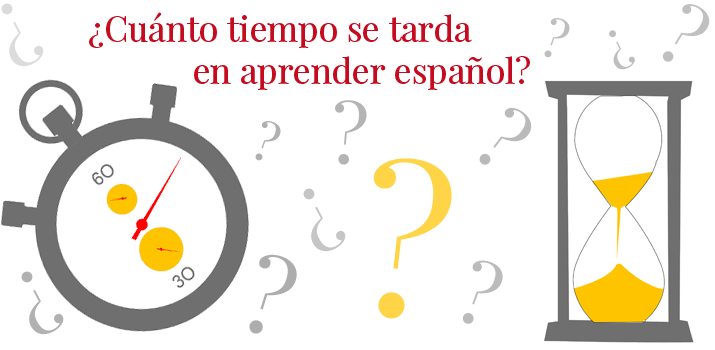For first-time language learners it is easy to be swayed by the flim-flam. In the 1980s it was Spanish in 3 months a popular beginners course consisting of a book and two or three cassettes (note to younger readers: cassettes were a bit like a mechanical mp3 that you needed to wind up with a pencil). As the pace of living heated up the promises became more ‘optimistic’. The need to grab attention required ever more outrageous claims.
Spanish in a week
One day Italian
Half-hour Hurdu
Five minute French
Spanish has already reached ‘Lightspeed’!
Can the promised learning speeds get any faster? Perhaps Fluent Swahili in a nano-second. No, I’ve got it;
Finnish before you Start*.
So just how long does it take to learn Spanish?
A simple straightforward question, sadly the answer is depende de que…
The truth is, learning a language takes mucho tiempo.
Ok now that two-thirds of visitors have shot off looking for that quick fix, let’s get serious.
If you were born last century you have already learnt that some things do take time.
What is your goal?
Do you want to order a meal in a restaurant or have deep philosophical debates?
How motivated are you? How much time can you dedicate?
Phrasebook Spanish
If your meta is to commit some useful phrases to memory, such as; ¿Cuánto es? etc
20 to 30 minutes, three to four times a week for a month will perhaps be enough.
Of course memorising stock phrases parrot-fashion (with the greatest respect to parrots, I love ‘em) has severe limitations. Remembering ¿Dónde está la playa, por favor? is one thing, understanding the answer is another.
However it’s definitely still worthwhile and will make a trip to the local market more satisfying and also shows your interest.
How motivated are you and how much time can you dedicate?
How long does it take to become fluent?
Again a simple straightforward question that is impossible to answer properly with the same degree of simplicity.
Firstly,there is no single, objective definition of fluency.
The most internationally accepted and authoritative definitions of language proficiency are those described in the Common European Framework of Reference for languages.
CEFR Level B2 means that the learner ‘Can interact with a degree of fluency and spontaneity… with native speakers..without strain for either party.’
Best case scenario
If you are a precocious ten year old with an enquiring mind obsessed with language, doing a long term exchange program in Madrid or Lima, living with a very attentive, highly talkative family, while receiving intensive daily coaching from a team of gifted but impoverished language instructors being paid purely on results. Well I think you could probably achieve fluency in six months.
As that probably accounts for less than half of us, the rest need to have realistic expectations.
More likely scenario
If you are highly motivated and can find time to dedicate 90 minutes to two hours per day, six or seven days a week listening, reading and speaking you might get to B2 in 18 months to two years.
If you are working or studying full-time or have children to look after it will of course be difficult to find that much time. However if you add up the time spent commuting, doing the washing-up and taking the dog for a walk, suddenly a pair of earphones connected to your smartphone can make a huge difference.
Another important factor that will determine the time required is how different is Spanish to your native language (or another language you have learnt). If you already speak another romance language it will be easier to learn Spanish.
If your native language is English (or you have learnt it to a level where you can read this article) you still benefit from the large number of cognates with latin roots that came via Norman French. A shared alphabet is another big help.
It is more difficult for learners whose mother tongue is for example Mandarin or Russian.
Learning a language is a long journey that takes years. How long the journey takes depends on a whole load of factors: The level that you want to reach; how much time you can dedicate; your general language experience; whether you can visit/ live in a Spanish speaking country; the availability of things like meet ups where you live. The journey is long, but it can be fun and very satisfying as you travel along.
Settle in and enjoy the trip.
*Still to come.
In the unlikely case that you are a precocious ten year old with an enquiring mind obsessed with language, doing a long term exchange program in Madrid or Lima, living with a very attentive, highly talkative family, while receiving intensive daily coaching from a team of gifted but impoverished language instructors being paid purely on results. Well I think you could probably do it in six months.
As that probably accounts for less than half of us, the rest need to have realistic expectations.
Learning a language is a long journey that takes years. How long the journey takes depends on a whole load of factors: The level that you want to reach; how much time you can dedicate; how different is Spanish from your own (or another language you speak). If you already speak another romance language it will be easier to learn Spanish; your general language experience; whether you can visit/ live in a Spanish speaking country; the availability of things like meet ups where you live. The journey is long, but it can be fun and very satisfying as you travel along.
Settle in and enjoy the trip.
*Still to come.
Master Hindi in an earlier incarnation.
Fully Bilingual before the Big Bang.

